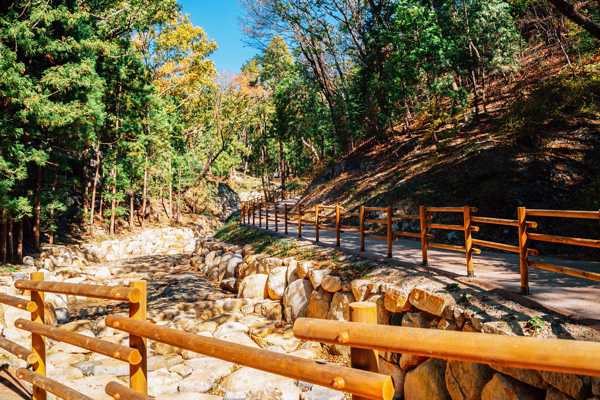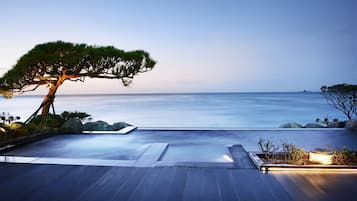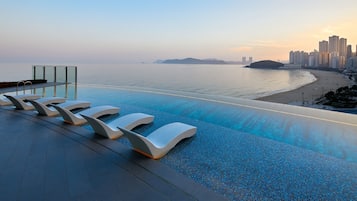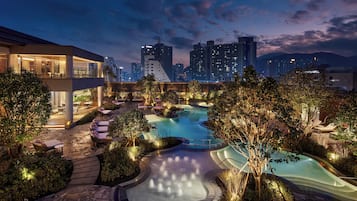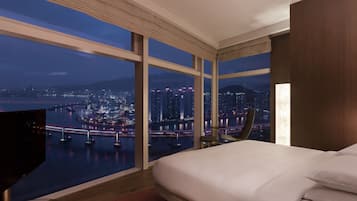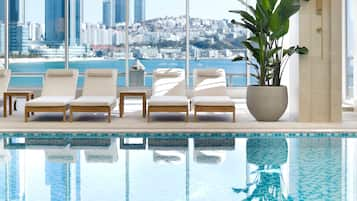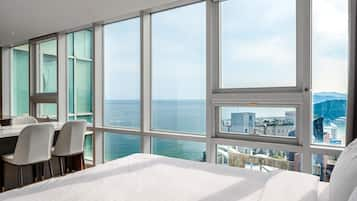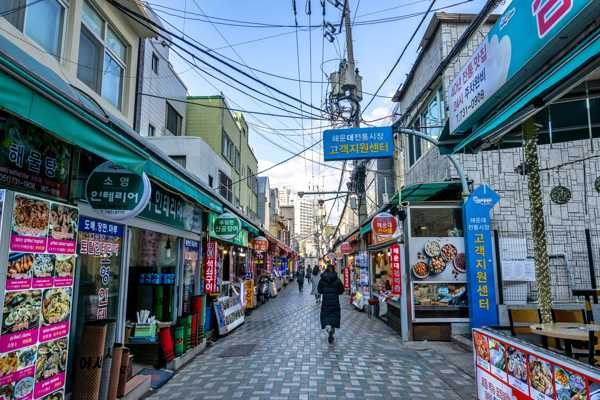The most popular neighbourhoods in Busan offer a variety of interesting attractions and activities in every nook and cranny. The city has a long history, as well as natural scenery and rich culture, which altogether makes it a place where you can find new unique charms no matter how many times you visit. Haeundae is home to Korea's representative beach, luxury hotels, and shopping malls, while Nampo-dong is where you can meet the true face of Busan up close while tasting a variety of food.
For those who love to party after a day of sightseeing, Gwangalli presents a ravishing nightscape. Geumjeong-gu preserves Buddhist temples and mountain villages with millenary history. You can also discover the new attractive sides of Busan in Saha-gu, which provides comfortable resting spaces where parks and forest trails come together. Centum City is where state-of-the-art skyscrapers and landmarks are densely concentrated. Read our guide to Busan neighbourhoods to discover an area that best suits your preference.
- 1
Haeundae
Urban tourist centre for sightseeing, leisure, shopping, and entertainment

- Ẩm thực
- Tín đồ mua sắm
Haeundae is a modern urban tourist centre where you can enjoy sightseeing, recreation, shopping and entertainment in one place. Haeundae offers everything you need for a fun-filled trip, with Haeundae Beach, Busan Cinema Centre, Dalmajigogae Pass, Gwangandaegyo Bridge and other iconic landmarks and famous tourist attractions, and recreational facilities such as hotels, restaurants and shopping malls concentrated around the area.
Enjoy sea bathing and water sports at Busan's representative beach and feel the energy and passion of the youth. If you are seeking calm relaxation, climb atop Dalmajigogae Pass along Dalmaji-gil Street that forms a famous driving course in Busan. Centum City has huge department stores and shopping malls, where you can conveniently enjoy shopping and leisure activities. Haeundae is a year-round travel destination; it is filled with exciting attractions and tasty foods not just in summer, but throughout the four seasons.
Bản đồ - 2
Gwangalli
Beach full of attractions and many restaurants

- Ẩm thực
- Ảnh
Gwangalli is a hot tourist spot bustling with many attractions and eateries around the beach. Gwangalli Beach, famous for its clean water, is especially popular with young people. As romantic cafes and fine-casual raw fish restaurants are concentrated around the beach, you can taste a variety of food while admiring the superb view of the beach and Gwangandaegyo Bridge. You can also enrich your cultural life watching performances held on the outdoor stage or street concerts.
To add some activities to your trip, try yachting at the nearby yachting centre. You can also sail off on a yacht tour, where you can have a barbecue party on board or stay for the night on the yacht. As Gwangalli is famous for the beautiful night view of the beach and city, night yachting is highly recommended.
Bản đồ - 3
Seomyeon
Downtown area showing the dynamism of the city

- Ẩm thực
- Tín đồ mua sắm
Seomyeon is the centre of Busan where various commercial facilities, financial, medical, and educational institutions are concentrated. It is a downtown area that shows the dynamism of the city. Since the city's public transportation routes and roads have been developed around Seomyeon, it provides easy access to most other parts of the city. Seomyeon also features many shopping and entertainment facilities.
In particular, Seomyeon Underground Shopping Mall, formed around Seomyeon Station, houses hundreds of stores selling a wide variety of products such as cosmetics, clothing, shoes, accessories, and bags. It is a lively shopping district fun to look around and shop for practical and trendy items. When you feel tired after shopping, stop by Seomyeon Market and try local delicacies such as dwaeji gukbap (pork soup), kalguksu (hot noodle soup), and Busan fish cakes. There are many gukbap restaurants that have been run for generations. Take your own gourmet tour through the market.
Bản đồẢnh của Minseong Kim (CC BY-SA 4.0) đã điều chỉnh
- 4
Nampo-dong
Neighbourhood showing the true face of the city

- Ẩm thực
- Tín đồ mua sắm
Nampo-dong, famous for a variety of food, is a place where you can discover the true face of Busan. It is a lively area crowded with locals and tourists alike not only on weekends but also on weekdays. Since the neighbourhood covers a fairly large area, one day may not be enough to explore every part of the area.
In Nampo-dong Gourmand Alley, you can taste a variety of local food, including the famous ssiat hotteok (griddlecake with sugar and seeds filling), various snacks, milmyeon (wheat noodles), dwaeji gukbap (pork soup), fusion Japanese food, and other foreign food. The nearby Gukje Market and Bupyeong Kkangtong Market are places where you can discover all kinds of new and unique items. Have fun finding hidden treasures in the market. Crossing the street from BIFF Square, which houses handprints of film directors and actors, you will reach Jagalchi Market. At this market, you can buy fresh or dried seafood and taste them raw on site. Meet the true face of Busan in Nampo-dong.
Bản đồẢnh của Christophe95 (CC BY-SA 4.0) đã điều chỉnh
- 5
Jung-gu
Old downtown preserving the city's history and culture

- Ẩm thực
- Lịch sử
- Ảnh
- Tín đồ mua sắm
Jung-gu is the old downtown of Busan and represents the city's rich culture and long history that encountered the Japanese occupation, liberation, the Korean War, and industrialization. The area once suffered a downturn but has been revived as a hub of transportation and tourism.
Yongdusan Park is a symbol of Busan's history. If you climb atop Busan Tower, a famous landmark of Yongdusan Park, you can get a full view of the city centre. The escalator connecting Yongdusan Park and Gwangbok-ro Street has recently been installed with LED panels on its canopy roof, adding another attraction to the area. When traveling in Jung-gu, Bosu Book Alley is a must-visit place. This is a narrow street of used bookstores near Gukje Market, and if you're lucky, you can find books that are rare and out of print now. The street also has many distinctive cafes where you can enjoy reading books over a cup of coffee.
Bản đồ - 6
Sasang-gu
Nature-friendly area with various forest trails and parks

- Giá rẻ
- Cặp đôi
- Gia đình
- Ảnh
Sasang-gu, located in the western part of Busan, is an ideal destination for those who want to escape from busy city life and relax in nature. Samnak Eco Park is popular with family picnickers, equipped with acupressure paths, wildflower and lotus complexes, and wetland ecological gardens. Myeongpum Garo Park, located in the centre of transportation, has good accessibility to the intercity bus terminal and subway and light rail stations. Walking along the 700-metre-long trail, you can see various species of trees and wildflowers, and waterscape facilities.
There are also paths created with different themes, including the Forest Path of Contemplation, the Forest Path for Good Health, and the Nakdonggang Embankment Path, where you can appreciate the natural scenery while strolling. In particular, the Nakdonggang Embankment Path is famous for the beautiful scenery created by cherry blossoms in spring, Asian fringe trees in summer, yellow and red coloured foliage in autumn, and red camellia flowers in winter.
Bản đồ - 7
Yeongdo-gu
Home to many famous coastal tourist attractions

- Lịch sử
- Ảnh
- Độc đáo
Yeongdo-gu, Korea's sole district that consists only of islands, is home to many coastal tourist attractions. In particular, the area is famous for the "8 Scenic Views of Yeongdo," namely Taejongdae, Yeongdodaegyo Bridge, Jeoryeong Coastal Trail, Bongnaesan Mountain, Jodo Island, 75 Plaza, Dongsam-dong Shell Midden Museum, and Gamjihaebyeon Coastal Trail. Yeongdo-gu is home to Taejongdae that many tourists visit to see the coastal cliffs and oddly shaped rocks. Yeongdodaegyo Bridge is Busan's first bridge constructed to connect the land with an island. Designed to allow ships to pass underneath by pulling up a section of its deck, it is one of the landmarks that symbolize Busan.
Yeongdo-gu also features several unique cultural theme villages including Huinnyeoul Culture Village, Haedoji Village, Kangkangee Arts Village, and Shell Midden Mural Street, which promote the value of culture and art. Take a stroll through the quaint alleys of these villages and take pictures that will be cherished for a lifetime against the backdrop of their unique scenery. It is also recommended to take a tourist bus and tour the major attractions of Yeongdo-gu with a guide.
Bản đồ - 8
Gamcheon
Village that elevated painful history into art

- Giá rẻ
- Lịch sử
- Ảnh
Gamcheon, a village formed by Korean War refugees in the 1950s, still preserves the traces of Korean modern history. The terraced houses standing along the mountainside and interconnected alleyways create a peculiar atmosphere of this village.
To revitalize the village, local artists and residents worked together in a project to create paintings on the walls or buildings, which transformed this once backward area into a representative tourist destination in Busan. You can have various art and cultural experiences and create your own work of art at a workshop in the village. If you want to indulge in the atmosphere of this village for a little longer, you can easily find a guest house to stay overnight.
Bản đồ - 9
Geumjeong-gu
Home to a mountain that has long been cherished by locals

- Giá rẻ
- Ẩm thực
- Lịch sử
Geumjeong-gu is an area boasting clean nature represented by Geumjeongsan Mountain, which has long held great significance to the people of Busan. From top of the mountain, which has different charms in each season, you can admire the beautiful natural scenery and the panoramic view of the city. Beomeosa Temple, located halfway up the mountain, is a prestigious temple with a history of more than a thousand years where you can restore your body and mind in a tranquil atmosphere. At the foot of the mountain is a small village where you can taste local foods such as black goat bulgogi (seasoned barbecue), makgeolli (rice wine), roast duck, and dotori muk (acorn jelly salad).
Geumjeong-gu has so many attractions that you can plan your trip with various themes, such as history, culture, and nature. As a mountainous area, it is an optimal place for mountain sports such as mountain biking, hang gliding, and rock climbing. Don't miss out on any fun in this exciting area.
Bản đồ - 10
Centum City
Innovative district full of iconic landmarks

- Ảnh
- Tín đồ mua sắm
Centum City, created on the banks of the Suyeonggang River in Haeundae-gu, Busan, is an industrial complex functioning as a centre of information and communications, entertainment, and international business. The Busan Exhibition and Convention Centre (BEXCO) is the most famous landmark of Centum City. It is a general exhibition hall where various exhibitions, events and conferences are held. The Shinsegae Department Store Centum City branch was listed in the Guinness Book of World Records as the world's largest department store. The Busan Cinema Centre, the exclusive venue of the Busan International Film Festival, is a symbolic building in the Korean film industry. The building itself, embodying the aesthetics of deconstructivist architecture, is a work of art.
Unlike other areas in Busan that preserve the historic sites and nature of the city, Centum City is filled with state-of-the-art buildings. You will feel overwhelmed by these iconic landmarks on par with the world's most famous buildings. If you want to feel the modern side of Busan, don't forget to visit Centum City.
Bản đồ



